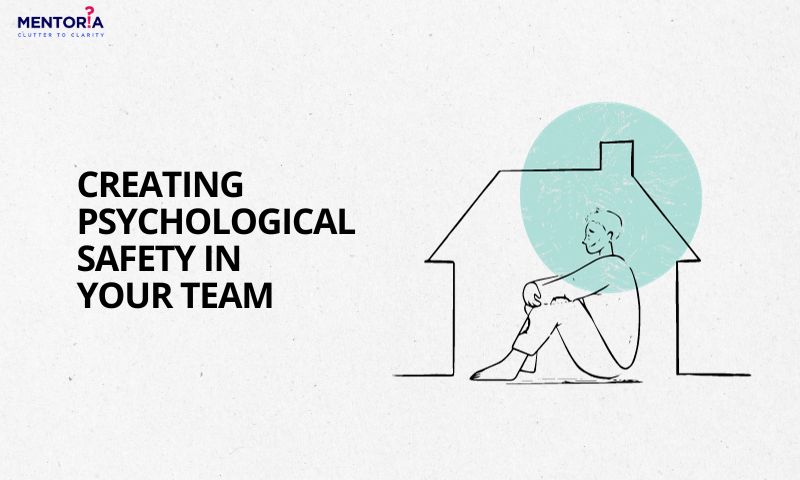Creating Psychological Safety In Your Team

Creating psychological safety in your team isn’t about rocket science or complex formulas. It’s more like planting a seed of trust and watching it grow into a forest of confidence and collaboration.
Think about your team as a cosy campfire circle where everyone feels comfortable sharing their marshmallow-roasting stories. It’s that safe space where no one’s afraid of being burned, where ideas and concerns flow freely, and where everyone’s voice matters. In this essay, we’ll walk you through the simple steps to foster this essential atmosphere in your team because, let’s face it, who doesn’t want to work in a place where you can be yourself, make mistakes, and still high-five your way to success?
The Magic Of Psychological Safety
Before we roll up our sleeves and get to work, let’s understand the magic we’re dealing with. Psychological safety is the secret sauce that helps teams perform at their best. It’s all about creating an environment where everyone feels comfortable sharing their ideas, making mistakes, and growing without fear of judgement or reprisal.
- Open Communication: In a psychologically safe team, open communication is the norm. Team members freely express their thoughts and concerns without hesitation.
- Innovation and Creativity: A safe space encourages innovative thinking. Team members are more likely to think outside the box when they feel secure.
- Risk-Taking: With psychological safety, individuals are more willing to take calculated risks, which can lead to groundbreaking achievements.
- Stronger Bonds: Trust and collaboration among team members are strengthened, fostering a sense of unity.
Creating Psychological Safety: The How-To Guide
Now, let’s roll up our sleeves and get into the nitty-gritty of creating psychological safety within your team:
- Lead by Example: As a leader, you set the tone. Your behaviour influences how your team members interact. Be open, approachable, and willing to admit when you make mistakes. This shows that it’s okay to be imperfect and encourages others to do the same.
- Promote Active Listening: Active listening is a superpower when it comes to creating psychological safety. Make sure your team members feel heard and valued. When someone is speaking, resist the urge to formulate your response while they’re still talking. Instead, genuinely listen and ask follow-up questions to show that you care about their perspective.
- Encourage Questions: Questions are a powerful tool for learning and growth. Encourage your team to ask questions, even if they seem basic. This not only fosters learning but also demonstrates that it’s safe to admit when you don’t know something.
- Celebrate Mistakes: Mistakes are a natural part of any learning process. Encourage your team to view mistakes as opportunities for growth, and celebrate them as steps on the path to success. This mindset shift can work wonders for psychological safety.
- Respect Boundaries: Not everyone is comfortable sharing their whole life story at work. Respect personal boundaries and avoid prying into private matters. By showing you respect the personal lives of your team members, you build trust and a safer working environment.
Unique Insight: The Power Of Silence
One lesser-known but highly effective technique to create psychological safety is to embrace the power of silence. Sometimes, team members need time to process their thoughts and articulate their ideas. Don’t rush them. Allow moments of silence in meetings, and you’ll be amazed at the depth of reflection and creativity it can unleash.
Diversity And Inclusion: The Cornerstones Of Psychological Safety
Another unique aspect to consider is the role of diversity and inclusion. A diverse team, with members from various backgrounds, experiences, and perspectives, can greatly enhance psychological safety. Here’s how:
- Diverse Perspectives: Different backgrounds and life experiences bring a variety of viewpoints to the table. This diversity can lead to more comprehensive discussions and creative problem-solving.
- Inclusivity: When team members feel their unique qualities are not only acknowledged but celebrated, they’re more likely to open up and contribute freely.
- Empathy: Exposure to diverse perspectives fosters empathy, as team members learn to understand and appreciate each other’s experiences and challenges.
Unique Insight: Micro-Affirmations
Micro-affirmations are subtle, often non-verbal, acts that signal respect and support. They can include things like nodding in agreement, making eye contact, or using positive body language during conversations. Incorporating micro-affirmations in your interactions can significantly contribute to psychological safety.
Handling Challenges
In the pursuit of psychological safety, you might encounter challenges:
- Resistance to Change: Some team members may be resistant to change and may not immediately embrace the principles of psychological safety. It’s essential to be patient and persistent.
- Conflict: Encouraging open communication might lead to conflicts, which is natural. The key is to guide your team through conflicts constructively, helping them find solutions and common ground.
- Maintaining Consistency: Creating psychological safety isn’t a one-time task; it’s an ongoing commitment. Consistency is vital, as trust can be easily eroded.
A Few More Tips
To wrap up our journey into psychological safety, here are a few more tips that you might find unique:
Use Non-verbal Cues: Body language, facial expressions, and tone of voice all play a significant role in creating a safe environment. Be mindful of your non-verbal cues.
Anonymous Feedback: Sometimes, team members may feel safer providing feedback anonymously. Consider using tools or methods that allow for confidential input.
Recognise and Reward: Acknowledge and reward team members for their contributions to creating a psychologically safe environment. This can be as simple as a public shoutout or a more formal recognition program.
Mentoria: Your Partner In Team Development
If you’re looking for guidance and support in creating psychological safety within your team, look no further than Mentoria. Our team of experts specialises in team development and can provide you with the tools and strategies to build a culture of trust, collaboration, and growth.
With Mentoria, you’ll gain access to resources, training, and coaching that can help your team thrive. We understand the importance of psychological safety and can tailor our services to meet your specific needs. Whether it’s through workshops, team-building exercises, or one-on-one coaching, Mentoria is your partner in creating a team that feels safe, valued, and empowered.









